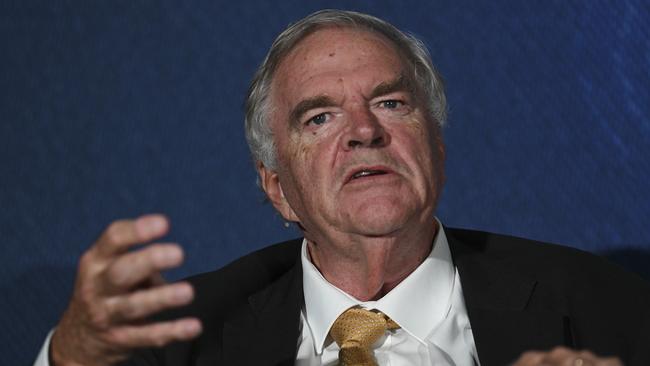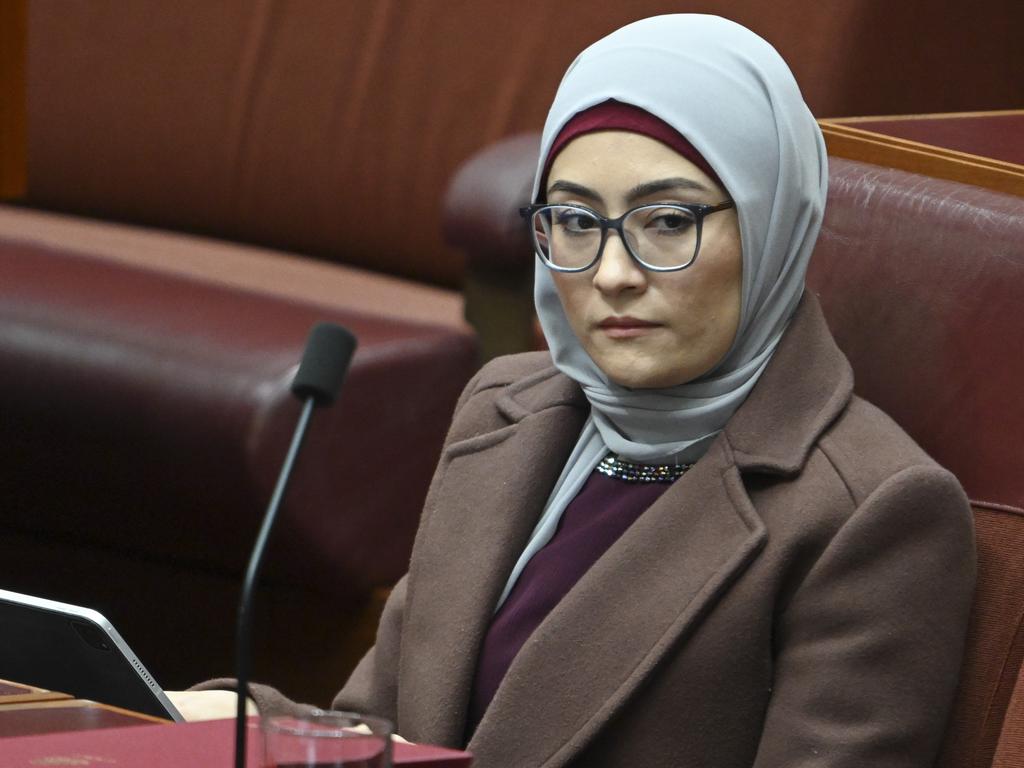Young Labor tells Anthony Albanese: we stand with Fatima Payman
As Young Labor branches revolt against the treatment of Fatima Payman, Labor figures are backing an overhaul of the party’s rules on backbenchers crossing the floor.

Young Labor branches are revolting against the treatment of West Australian senator Fatima Payman by the Albanese government, as some Labor MPs and officials back an overhaul to the more than 120-year-old party rule that prohibits parliamentarians from crossing the floor.
While many government sources said Senator Payman’s actions – which included crossing the floor on a Greens motion to recognise Palestine without raising the matter in caucus first – represented a “betrayal”, Young Labor members said they “stood with Senator Payman”.
The Australian revealed on Monday Mr Albanese’s foundational faction, the NSW Young Labor Left, is promoting Senator Payman as a special guest in a forum next week to promote the cause of Palestine despite her resignation from the party.
The Young Labor Left has also celebrated the re-election in the UK of former British Labour leader Jeremy Corbyn, who was suspended from the party over his mishandling of claims of anti-Semitism and later expelled for running as an independent.

The Facebook flyer shows an image of Ms Payman claiming she would join the forum next Tuesday via zoom alongside NSW upper house Labor member Anthony D’Adam and union activist from the Maritime Union of Australia, Erima Dall.
It is branded as a Palestine and the Labour movement event, in reference to the UK party.
A spokesperson for Young Labor Left NSW said: “This event is not hosted by Young Labor Left. Not a single one of our members has been involved in any part of the organising and the event was organised before Senator Payman resigned from the party.”
A senior NSW Labor source said they were appalled at the inclusion of Senator Payman to an event promoted by Labor, of which she was no longer a member, as well as its celebration of Mr Corbyn.
“As a senior member of the NSW Labor Party I am appalled, shocked and horrified by the actions of this group which is rallying around Labor rats,” the source said.
Young Labor member Ngaire Bogemann, who is the National Union of Students president, said the ALP’s rules against crossing the floor were being used to “block debate and silence activists”.
“A lot of (ALP) members have been considering withdrawing membership,” she said.
The Young Labor revolt came as The Australian spoke to federal Labor MPs who want the solidarity rule changed, after Senator Payman last week quit the ALP over its refusal to recognise Palestine as a state.
But the MPs, who did not want to be named, have an uphill battle to secure a change to the rules, with the vast majority of Anthony Albanese’s caucus backing the requirement for Labor parliamentarians to vote in accordance with the party position.
Victorian Left faction assistant secretary Julijana Todorovic said she was concerned over what the treatment of Senator Payman said about “the prospects of success (for) opinionated young women in the ALP going forward”.
“I certainly hope that the lesson taken away is not ‘young women are too flighty to be preselected’ or ‘they can’t be trusted to toe the line’,” said Ms Todorovic, who is a former Victorian Young Labor president.
“We (would) then be in a world of pain.
“Caucus structures need to meaningfully accommodate and welcome diverse views across the ethnic, gender and age spectrum.
“This point around the difference between (crossing the floor on) legislation and motions should be examined.”
One federal Labor MP told The Australian discussion around the need to change the solidarity rules were occurring “in a number of internal forums”.
“There’s a conversation happening around this,” the Labor source said.
“I’m open to having conversations on how conscience votes should work, whether we treat voting against legislation or motions the same … and just not being afraid of flexibility.”
Senator Payman’s move to the crossbench as an independent prompted backlash from colleagues, many of whom said they would have resigned from parliament and given the Senate seat back to Labor if they had been in her position.
Others raised Senator Payman’s Afghan citizenship as a risk to her remaining in the Senate because of a potential breach of section 44 of the Constitution.
Senator Payman declared on Monday such backgrounding against her by former colleagues was “bizarre”.
“This may set a precedence that is not really constructive to our modern-day Australia that we’re living in, but in saying that, I’m not going to dwell on what people have been doing,” she told the ABC.
She added that she would be spending the next month visiting constituents across WA and finding out what they wanted her to campaign on “without any boundaries or restrictions of party rules and confinements”.
As part of the federal parliamentary candidates’ pledge signed upon being elected, Labor MPs promise to vote with the party “on all questions before the parliament”.
Failure to do so typically prompts MPs to resign or face expulsion or suspension.
Despite criticism from within the party over the Prime Minister’s decision to ban Senator Payman from just one caucus meeting after she crossed the floor – which was extended to an indefinite suspension once she vowed to do so again – former Labor leader Kim Beazley said the government had acted appropriately.
“The federal leadership has handled this as well as they can,” Mr Beazley said.

Former Left faction heavyweight Kim Carr – who helped make Kevin Rudd prime minister – said caucus solidarity should not be watered down, arguing there was no evidence Senator Payman raised her concerns with the leadership team.
“The solidarity pledge came about to ensure that the Labor Party could fulfil its mission as a party of social change,” Mr Carr said.
Many senior Labor figures have previously raised the need for more flexibility around the party’s solidarity rules, including Joel Fitzgibbon and Chris Bowen.
When asked if he still held the view expressed a decade ago that Labor rules were “too restrictive”, Mr Bowen did not respond.
Former Labor minister Melissa Parke – who abstained from a vote on a national security matter in 2014 but remained in the party – said the ALP’s solidarity rules needed to be changed.
“The party always seems to have a mechanism to allow a conscience vote when the issue is one that offends the Right faction – anything to do with religion (and) abortion – but not a similar allowance for those with a progressive conscience. I believe this is something the Labor Party should review,” Ms Parke, the former MP for Fremantle, said.
“Politically speaking, it should not be a hanging offence to cross the floor … I understand the point about collective decision making in the Labor Party, but many decisions are taken by the leadership and not the collective.”
Labor MP Josh Wilson, who replaced Ms Park in the seat of Fremantle, said the solidarity voting rule should remain.
“The capacity to design and deliver positive change does depend on respect and solidarity in a shared and collective cause that is shaped by a fair and democratic process,” said Mr Wilson, who last year expressed his opposition to the AUKUS nuclear submarine deal with the US and Britain.
“When I was first elected, Labor had not committed to managing the end of the marginal and harmful live sheep export trade; I accepted that position while arguing for change. I am glad and grateful that we changed our policy position in 2018 and (last) week we legislated that outcome.”
Macarthur MP Mike Freelander, another backbencher who has expressed views contrary to the party’s position in the past, said the solidarity rules should remain unchanged.
“I’ve had disagreements with ministers over a whole range of things … but I do think solidarity is very important as a government,” he said.







To join the conversation, please log in. Don't have an account? Register
Join the conversation, you are commenting as Logout